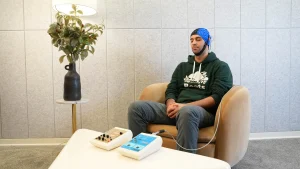Sleep is more than just a period of rest for the body; it’s a critical process that supports overall mental and emotional well-being. In our fast-paced modern lives, sleep often takes a back seat to work, social engagements, or screen time, but its absence can have profound and far-reaching effects on mental health. In this blog, we’ll explore the importance of sleep, how poor sleep affects your mind and body, and practical steps to improve your sleep quality.
The Critical Role of Sleep in Mental Health
Sleep is essential for every aspect of life, from physical repair to cognitive processing. When you sleep, your brain consolidates memories, processes emotions, and detoxifies harmful byproducts that accumulate during the day. During different stages of sleep—ranging from light sleep to deep slow-wave sleep and REM (Rapid Eye Movement) sleep—your brain and body undergo processes that are vital for mental health.
Key Functions of Sleep:
- Memory Consolidation: Sleep helps stabilize and integrate the information you learned throughout the day.
- Emotional Regulation: Adequate sleep allows for better management of stress and emotional responses, reducing irritability and mood swings.
- Cognitive Function: Sleep improves concentration, problem-solving, and decision-making.
- Physical Restoration: It supports overall health by repairing cells, regulating metabolism, and balancing hormones.

How Poor Sleep Affects Your Mind
When sleep is compromised, the effects on mental health can be immediate and significant. Here are some of the ways poor sleep affects your cognitive and emotional functioning:
1. Increased Anxiety and Stress
- Overactive Stress Response: Lack of sleep can lead to an overactive amygdala—the part of the brain that processes emotions—resulting in heightened stress and anxiety levels.
- Reduced Resilience: When sleep-deprived, the brain’s ability to manage stress is compromised, making it harder to bounce back from daily challenges.
2. Mood Disorders
- Depression: Poor sleep has a strong correlation with depression. Insufficient or fragmented sleep can disrupt neurotransmitter balances (such as serotonin and dopamine), which play crucial roles in mood regulation.
- Irritability and Emotional Volatility: Without adequate sleep, you’re more likely to experience rapid mood swings, irritability, and even feelings of anger or frustration.
3. Impaired Cognitive Function
- Memory Issues: Sleep deprivation interferes with the brain’s ability to form and retrieve memories, making it difficult to remember details or learn new information.
- Concentration and Decision-Making: Fatigue hampers focus and critical thinking, which can affect work, academic performance, and everyday decision-making.
4. Reduced Coping Mechanisms
- Lowered Patience and Problem-Solving: Poor sleep can leave you feeling overwhelmed by minor setbacks, reducing your ability to cope with stress effectively.
- Risk of Overreacting: The diminished capacity for emotional regulation may lead to disproportionate reactions to everyday challenges.

How Poor Sleep Affects Your Body
The consequences of poor sleep extend beyond mental health, impacting physical health and overall quality of life:
1. Hormonal Imbalances
- Increased Cortisol Levels: Sleep deprivation raises cortisol levels, the body’s primary stress hormone, which can lead to long-term issues like weight gain, high blood pressure, and a weakened immune system.
- Disrupted Appetite Regulation: Hormones like leptin and ghrelin, which control hunger and satiety, can become imbalanced, often leading to overeating or unhealthy food choices.
2. Cardiovascular Health
- Heart Disease Risk: Chronic sleep deprivation has been linked to an increased risk of heart disease, as poor sleep affects blood pressure regulation and heart rate.
- Inflammation: Lack of sleep contributes to chronic inflammation, a risk factor for a variety of conditions including diabetes, arthritis, and cardiovascular diseases.
3. Energy and Physical Performance
- Reduced Energy Levels: Without proper rest, your energy levels plummet, making daily activities and exercise more challenging.
- Weakened Immune Function: Poor sleep compromises the immune system, increasing your susceptibility to infections and slowing recovery from illnesses.

The Vicious Cycle: Sleep and Mental Health
The relationship between sleep and mental health is bidirectional—a disruption in one often leads to problems in the other. For example, anxiety and depression can make it difficult to fall asleep or stay asleep, while chronic sleep deprivation exacerbates these conditions. This cycle can create a downward spiral that impacts every aspect of life.
Breaking the Cycle:
- Early Intervention: Recognizing and addressing sleep issues early can help prevent the development or worsening of mental health problems.
- Holistic Approaches: Combining behavioral strategies, cognitive therapies, and sometimes medication can improve sleep quality and, in turn, mental health.
Practical Steps to Improve Your Sleep
Improving sleep quality doesn’t necessarily require drastic changes. Here are some practical, evidence-based strategies to help you achieve better sleep and, by extension, better mental health:
1. Establish a Consistent Sleep Routine
- Regular Bedtime and Wake Time: Going to bed and waking up at the same time every day—even on weekends—helps regulate your body’s internal clock.
- Wind-Down Rituals: Develop a relaxing pre-sleep routine, such as reading, gentle stretching, or taking a warm bath.
2. Optimize Your Sleep Environment
- Comfortable Bedding and Temperature: Ensure your bedroom is cool, quiet, and dark. Invest in a comfortable mattress and pillows.
- Limit Screen Time: Reduce exposure to blue light from phones, computers, and TVs at least one hour before bedtime, as it can interfere with the production of melatonin, the sleep hormone.
3. Mindfulness and Relaxation Techniques
- Meditation and Deep Breathing: Practices like mindfulness meditation can calm the mind and prepare the body for sleep.
- Progressive Muscle Relaxation: This technique involves tensing and then relaxing each muscle group, reducing physical tension and promoting relaxation.
4. Lifestyle Adjustments
- Regular Exercise: Engaging in moderate physical activity during the day can help regulate your sleep cycle, but avoid intense exercise close to bedtime.
- Balanced Diet: Avoid heavy meals, caffeine, and alcohol before bedtime, as these can disrupt sleep patterns.
5. Seek Professional Help if Needed
- Sleep Disorders: If you suspect you have a sleep disorder (like insomnia or sleep apnea), consult a healthcare provider for proper diagnosis and treatment.
- Mental Health Support: For persistent anxiety or depression affecting sleep, therapy or counseling can provide targeted strategies to manage both issues simultaneously.
Conclusion
The relationship between sleep and mental health is profound and multifaceted. Poor sleep not only hampers cognitive function and emotional regulation but also sets off a cascade of physical health problems that can worsen overall well-being. By recognizing the signs of sleep deprivation and taking proactive steps to improve sleep quality, you can break the vicious cycle that undermines mental health and reclaim a sense of balance and vitality.
Whether you’re struggling with stress, anxiety, or just not feeling your best, investing in good sleep hygiene is one of the most powerful, accessible tools you have for enhancing your mental health. Start with small changes today, and remember that every night of quality sleep is a step toward a healthier, happier you.
Elumind Centres for Brain Excellence is an integrated mental health center offering solutions that can help you with your mental/brain health needs. To start your journey, book your FREE 15-MINUTE PHONE CONSULTATION. We are here for you.








